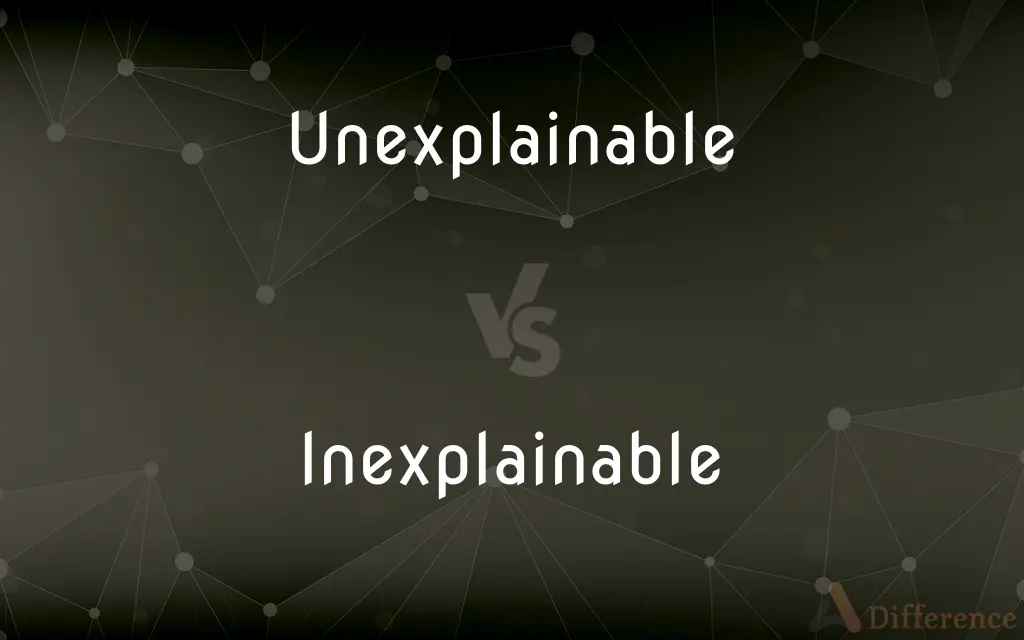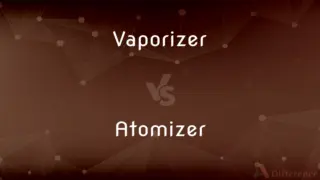Unexplainable vs. Inexplainable — What's the Difference?
Edited by Tayyaba Rehman — By Maham Liaqat — Updated on April 8, 2024
Unexplainable refers to something that cannot be explained due to its complexity or mystery, while inexplainable often denotes a lack of explanation due to insufficient information or understanding.

Difference Between Unexplainable and Inexplainable
Table of Contents
ADVERTISEMENT
Key Differences
Unexplainable phenomena are often those that elude rational or scientific understanding, suggesting a level of complexity or mystery that defies explanation. On the other hand, inexplainable situations might simply lack the necessary information or context for a clear explanation, indicating a gap in knowledge rather than an inherent mystery.
While unexplainable is commonly used to describe events or phenomena that seem to transcend the limits of human comprehension, such as paranormal activities, inexplainable often applies to more mundane circumstances where the reason or cause is not immediately apparent but might be uncovered with further investigation.
Unexplainable often carries a connotation of wonder or awe, as it is frequently associated with things that are mysterious or beyond the realm of current scientific understanding. In contrast, inexplainable can imply a temporary state of confusion or ignorance that might be resolved with more information or analysis.
In literature and art, unexplainable elements are used to evoke a sense of the supernatural or the sublime, inviting audiences to ponder the mysteries of the universe. Whereas, inexplainable elements might be employed to highlight the limits of human knowledge or the complexity of a situation, encouraging a search for deeper understanding.
In everyday language, people might describe a feeling or an experience as unexplainable when it touches them in a way that they find difficult to articulate, suggesting an emotional depth or intensity that words fail to capture. In contrast, describing something as inexplainable often suggests a more practical challenge of communication or comprehension, awaiting a solution or clarification.
ADVERTISEMENT
Comparison Chart
Definition
Incapable of being explained through known scientific principles
Lacking an explanation due to insufficient information or clarity
Connotation
Often implies mystery or a sense of wonder
Suggests a gap in knowledge or understanding
Typical Usage Context
Paranormal phenomena, profound experiences
Mundane situations with unclear details
Resolution Possibility
May remain permanently mysterious
Potentially resolvable with more information or research
Associated Emotions
Awe, curiosity, sometimes fear
Confusion, frustration, eventually enlightenment if explained
Compare with Definitions
Unexplainable
Not able to be rationalized or logically understood.
They encountered an unexplainable phenomenon on their expedition.
Inexplainable
Not explained due to a lack of information.
The sudden weather change was inexplainable with the data available.
Unexplainable
Beyond the ability to describe or understand.
The unexplainable beauty of the cosmos has always fascinated humans.
Inexplainable
Marked by an absence of a clear explanation.
The disappearance of the documents was inexplainable, leading to much speculation.
Unexplainable
Lacking a scientific or logical explanation.
The unexplainable nature of certain ancient artifacts baffles archaeologists.
Inexplainable
Incapable of being described for the time being.
The artist's motive behind the peculiar painting remained inexplainable.
Unexplainable
Mysterious or inexplicable.
He felt an unexplainable dread as he entered the old house.
Inexplainable
Temporarily beyond understanding.
To the untrained eye, the complex equation appeared inexplainable.
Unexplainable
Defying conventional wisdom or understanding.
Some aspects of quantum physics seem almost unexplainable.
Inexplainable
Requiring further information or context to understand.
Without the historical context, the significance of the event is inexplainable.
Unexplainable
Unable to be explained or accounted for
He was subject to unexplainable rages
Inexplainable
Difficult or impossible to explain; inexplicable.
Unexplainable
That doesn't have a known or readily available explaination.
Inexplainable
That cannot be explained.
Unexplainable
Not to be accounted for or explained;
Perceptible only as unaccountable influences that hinder progress
An unexplainable fear
Inexplainable
Incapable of being explained; inexplicable.
Common Curiosities
Can inexplainable situations become explainable?
Yes, inexplainable situations often become explainable with the acquisition of more information or through further investigation and research.
Is there a psychological impact of encountering unexplainable phenomena?
Encountering unexplainable phenomena can have a profound psychological impact, often leading to a deep sense of wonder or existential questioning.
What makes something unexplainable?
Something is considered unexplainable when it defies logical, scientific, or rational explanation due to its complexity or mysterious nature.
How do unexplainable phenomena affect people?
Unexplainable phenomena can evoke a range of emotions from wonder and awe to fear and anxiety, depending on the context and individual perceptions.
Can science turn unexplainable phenomena into explainable ones?
Over time, scientific advancements have transformed many previously unexplainable phenomena into explainable ones, though some mysteries remain.
Are unexplainable and inexplainable interchangeable?
While they are sometimes used interchangeably, unexplainable often implies a permanent state of mystery, whereas inexplainable suggests a temporary lack of explanation.
Why is it important to distinguish between unexplainable and inexplainable?
Distinguishing between the two helps clarify whether a situation is inherently mysterious or simply lacks current explanation, guiding how we approach understanding it.
What might cause a situation to be inexplainable?
A situation might be inexplainable due to a lack of crucial information, understanding, or context about it.
What is an example of an unexplainable phenomenon?
An example of an unexplainable phenomenon could be spontaneous remission in medical cases where a disease unexpectedly improves without a clear reason.
What role does evidence play in classifying something as inexplainable?
The absence or insufficiency of evidence is a key factor in classifying something as inexplainable, suggesting that further data could provide clarity.
How do personal beliefs influence what we consider unexplainable?
Personal beliefs, including religious or philosophical views, significantly influence what individuals consider to be unexplainable or mysterious.
How do cultures differ in their interpretation of unexplainable phenomena?
Different cultures interpret unexplainable phenomena through the lens of their own historical, religious, and cultural narratives, leading to a rich diversity of understandings.
How do experts deal with unexplainable phenomena in their field?
Experts often approach unexplainable phenomena with a combination of open-mindedness and skepticism, seeking to expand the boundaries of current knowledge.
Is it possible for something to be permanently unexplainable?
While some phenomena may seem permanently unexplainable with current knowledge, history shows that advancements in understanding can change this status.
Can technological advancements make more phenomena explainable?
Yes, technological advancements often provide new tools and methods to investigate and eventually explain phenomena that were once considered unexplainable.
Share Your Discovery

Previous Comparison
Vaporizer vs. Atomizer
Next Comparison
Samaritan vs. SamarianAuthor Spotlight
Written by
Maham LiaqatEdited by
Tayyaba RehmanTayyaba Rehman is a distinguished writer, currently serving as a primary contributor to askdifference.com. As a researcher in semantics and etymology, Tayyaba's passion for the complexity of languages and their distinctions has found a perfect home on the platform. Tayyaba delves into the intricacies of language, distinguishing between commonly confused words and phrases, thereby providing clarity for readers worldwide.














































